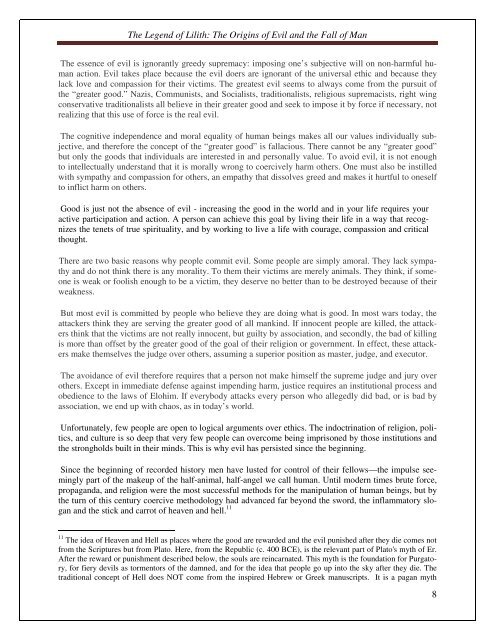You also want an ePaper? Increase the reach of your titles
YUMPU automatically turns print PDFs into web optimized ePapers that Google loves.
The Legend of Lilith: The Origins of Evil and the Fall of Man<br />
The essence of evil is ignorantly greedy supremacy: imposing one’s subjective will on non-harmful human<br />
action. Evil takes place because the evil doers are ignorant of the universal ethic and because they<br />
lack love and compassion for their victims. The greatest evil seems to always come from the pursuit of<br />
the “greater good.” Nazis, Communists, and Socialists, traditionalists, religious supremacists, right wing<br />
conservative traditionalists all believe in their greater good and seek to impose it by force if necessary, not<br />
realizing that this use of force is the real evil.<br />
The cognitive independence and moral equality of human beings makes all our values individually subjective,<br />
and therefore the concept of the “greater good” is fallacious. There cannot be any “greater good”<br />
but only the goods that individuals are interested in and personally value. To avoid evil, it is not enough<br />
to intellectually understand that it is morally wrong to coercively harm others. One must also be instilled<br />
with sympathy and compassion for others, an empathy that dissolves greed and makes it hurtful to oneself<br />
to inflict harm on others.<br />
Good is just not the absence of evil - increasing the good in the world and in your life requires your<br />
active participation and action. A person can achieve this goal by living their life in a way that recognizes<br />
the tenets of true spirituality, and by working to live a life with courage, compassion and critical<br />
thought.<br />
There are two basic reasons why people commit evil. Some people are simply amoral. They lack sympathy<br />
and do not think there is any morality. To them their victims are merely animals. They think, if someone<br />
is weak or foolish enough to be a victim, they deserve no better than to be destroyed because of their<br />
weakness.<br />
But most evil is committed by people who believe they are doing what is good. In most wars today, the<br />
attackers think they are serving the greater good of all mankind. If innocent people are killed, the attackers<br />
think that the victims are not really innocent, but guilty by association, and secondly, the bad of killing<br />
is more than offset by the greater good of the goal of their religion or government. In effect, these attackers<br />
make themselves the judge over others, assuming a superior position as master, judge, and executor.<br />
The avoidance of evil therefore requires that a person not make himself the supreme judge and jury over<br />
others. Except in immediate defense against impending harm, justice requires an institutional process and<br />
obedience to the laws of Elohim. If everybody attacks every person who allegedly did bad, or is bad by<br />
association, we end up with chaos, as in today’s world.<br />
Unfortunately, few people are open to logical arguments over ethics. The indoctrination of religion, politics,<br />
and culture is so deep that very few people can overcome being imprisoned by those institutions and<br />
the strongholds built in their minds. This is why evil has persisted since the beginning.<br />
Since the beginning of recorded history men have lusted for control of their fellows—the impulse seemingly<br />
part of the makeup of the half-animal, half-angel we call human. Until modern times brute force,<br />
propaganda, and religion were the most successful methods for the manipulation of human beings, but by<br />
the turn of this century coercive methodology had advanced far beyond the sword, the inflammatory slogan<br />
and the stick and carrot of heaven and hell. 11<br />
11 The idea of Heaven and Hell as places where the good are rewarded and the evil punished after they die comes not<br />
from the Scriptures but from Plato. Here, from the Republic (c. 400 BCE), is the relevant part of Plato's myth of Er.<br />
After the reward or punishment described below, the souls are reincarnated. This myth is the foundation for Purgatory,<br />
for fiery devils as tormentors of the damned, and for the idea that people go up into the sky after they die. The<br />
traditional concept of Hell does NOT come from the inspired Hebrew or Greek manuscripts. It is a pagan myth<br />
8


